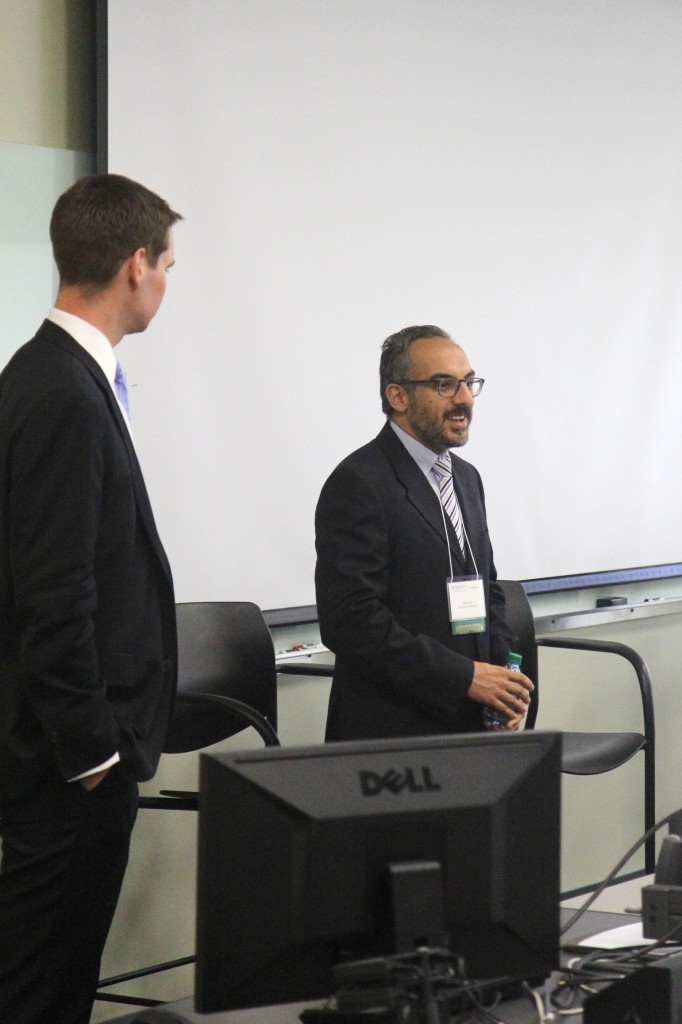
Innovation Day 2014 brought experts from different fields to Binghamton University’s Innovative Technologies Complex for an event called “Big Data, Making Sense of Our World.”
“Big data” is defined as data sets that are too large or complex to analyze using traditional methods. Instead of using analytics to report on what has already happened, researchers use big data to predict trends and patterns in order to make decisions.
Scott Hancock, the director of IP management and licensing for Entrepreneurship and Innovation Partnerships and one of the organizers, said the theme was chosen because of the large amounts of data being created from many different relevant sources such as social media.
“We’re in a world that is increasingly data-driven,” Hancock said. “There’s an acceleration of data being created, and people are going to have to figure out insights from sifting through all that data.”
Because of the variety of sources, big data can be used to create more specialized medical treatments that take lifestyle factors into account, market to target consumers more efficiently and impact government policy decisions for things such as insurance.
According to Katharine Frase, the chief technology officer for IBM and one of the speakers, the difficulty in processing big data stems from the increased potential for inaccuracy in the data.
“GPS signals aren’t always accurate. What we type into a tweet isn’t always precise. This notion of big data also includes a notion of uncertainty,” Frase said. “How can we make decisions if we aren’t sure the data is true?”
Panels featuring experts in the fields of health care, marketing and finance discussed how the collection and analysis of big data influences the decision-making processes in these fields. The kind of data needed to make these decisions is collected in the Small Scale Systems Integration and Packaging Center in BU’s Center of Excellence.
Topics at the conference also included the issues of ethical uses of data and how it affects privacy.
“We’re creating so much data, and there’s so much you can do with it,” said Per Stromhaug, assistant vice president for innovation and economic development. “There’s a huge business opportunity on the one side, but on the other side, it feels like a big threat to your privacy.”
Although math and data analysis skills are necessary for making sense of the vast amounts of data generated, Hancock said that researchers have to understand how the data collected by researchers will affect people.
“When you do the analysis, you have to have a sense of empathy or psychologically or sociologically understand how it relates to people,” he said. “It’s not just about bytes at the end of the day.”
Scott Zeger, professor and vice provost for research at Johns Hopkins University and the keynote speaker at the conference, said the expansion of big data analytics could be a source of employment for students.
“The capacity to think critically and to use data to address questions in a meaningful way is an important skill,” Zeger said. “If you develop that skillset, you’ll be highly marketable. There’s no shortage of opportunities for people who are thoughtful and know how to use data.”
Zeger added that those skills can be developed in fields aside from computer science and math.
“You can learn how to do this in economics, linguistics, psychology and many other different fields,” Zeger said.
Kourosh Nemati, a third-year doctoral candidate studying mechanical engineering, said he enjoyed the conference and the application of big data.
“This is the future,” Nemati said. “This will be helpful in a lot of ways.”
The event, held on Thursday by the Office of Entrepreneurship and Innovation Partnerships and the Center of Excellence.


